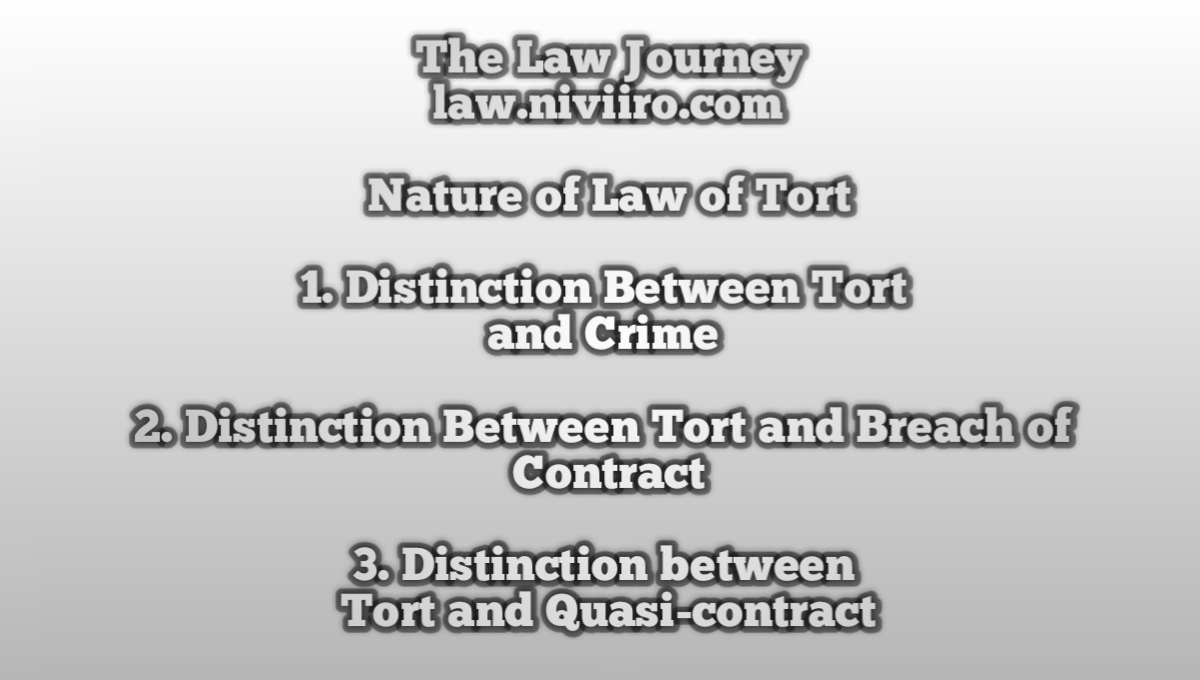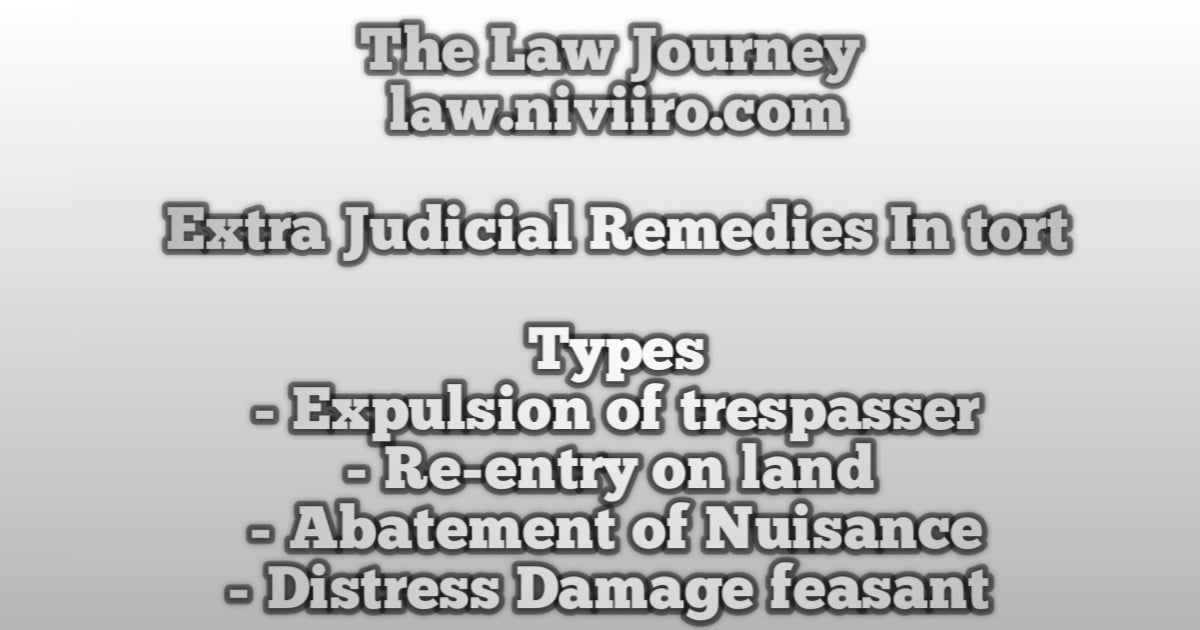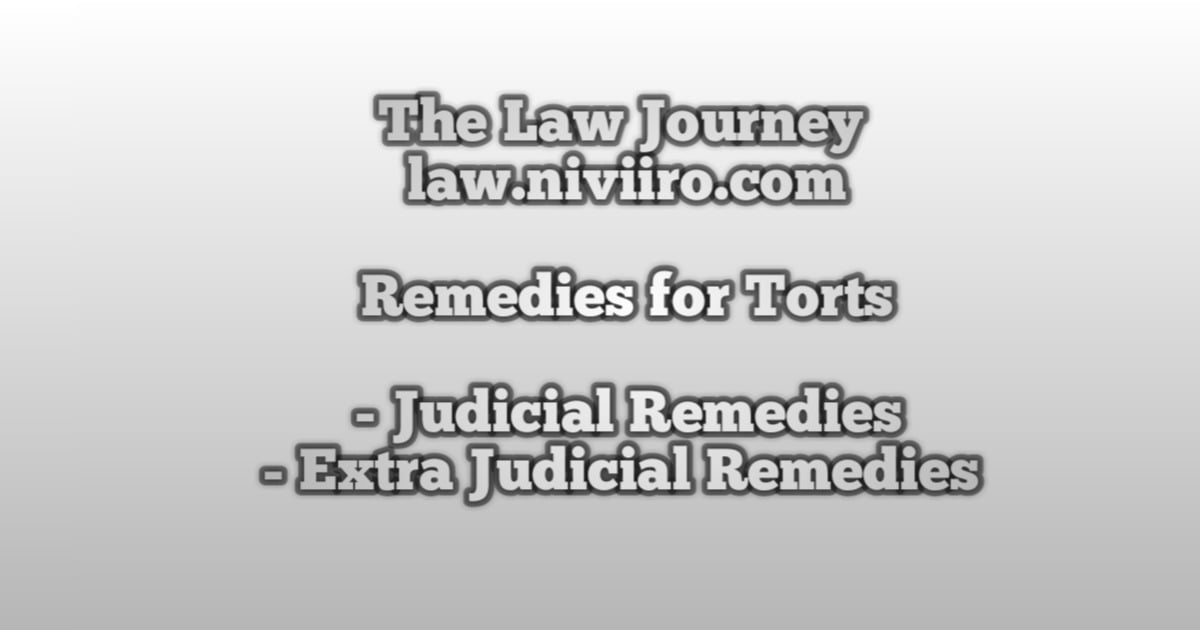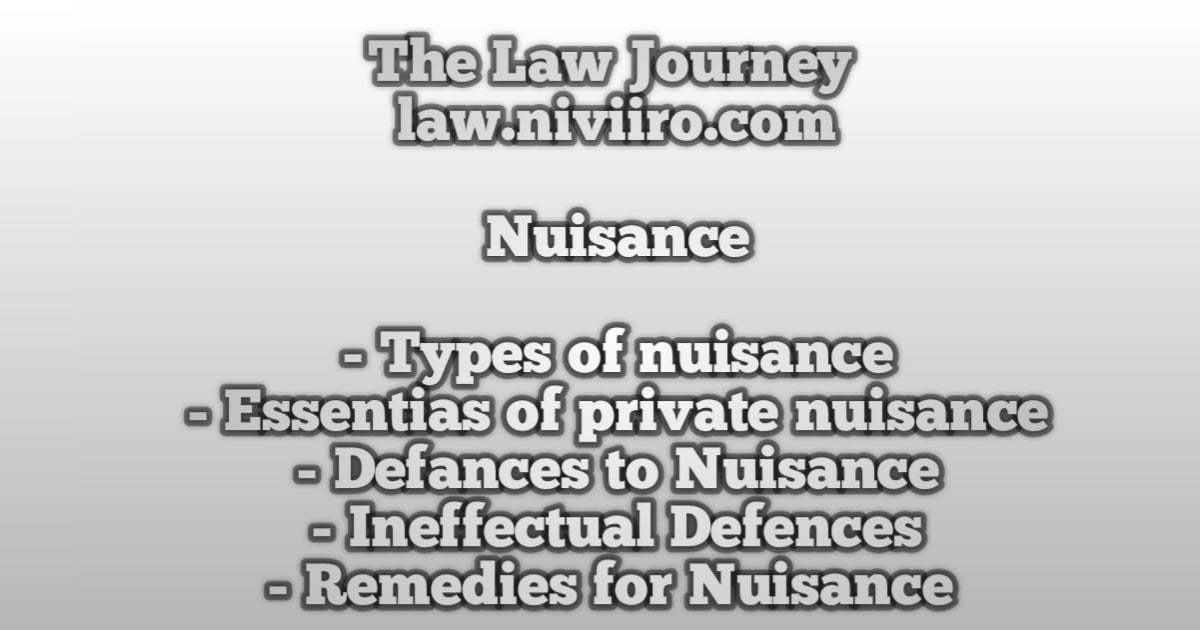The nature of law of torts can be understood by these distinction’s.
Distinction Between Tort and Crime | Nature of Law of Tort
| TORT | CRIME |
|---|---|
| 1. It is a private wrong i.e. an infringement of the private or civil right of an individual. It is comparatively less serious and labelled as civil wrong. For example, obstruction outside a particular house is a tort. | 1. It is a public wrong i.e. a wrong against the public at large or wrong against the State, even though the victim is an individual. It is a more serious wrong, for example, an obstruction in the middle of an public road is a crime. |
| 2. In tort, intention of the wrongdoer is not crucial in all cases (e.g. negligence). Further, a ‘strict’ liability makes the defendant liable for accidental harms caused without any intention and negligence on his part. In other words, sometimes the law recognizes ‘no fault’ liability. | 2. In a crime, intention of the wrongdoer is usually crucial in determining his liability. An ‘accidental’ crime entails lesser or no punishment. Motive in crime is not so crucial. |
| 3. Law of torts is uncodified, however, there is limitation period for filing of suits. | 3. Law of crimes is codified (e.g. Indian Penal Code, Criminal Procedure Code) and there is no bar of limitation of prosecution in crime. |
| 4. Detention, conversion, wrongful dismissal, etc. are purely civil wrongs i.e. torts. | 4. Dacoity, murder, forgery, etc. are purely criminal wrongs i.e. crimes. |
| 5. The rules applicable in a case of tort are generally different from those in the case of crime. For example, in the case of tortuous liability for the wrong of defamation, truth is in itself a defence. | 5. In an action for the offence of defamation, the defence of truth can be taken if the publication was made for public good. |
| 6. The suit has to be filed by the injured party as plaintiff and by none else. Parties may enter into a compromise and the suit may be withdrawn. | 6. The criminal proceedings are not brought by the injured party but by the State. Except in certain exceptional cases, the law does not permit a settlement in criminal cases. |
| 7. Damages or compensation to the injured party to make good the loss suffered by him, is the most common remedy of a tort. | 7. The wrongdoer is punished so as to deter him and other potential offenders from committing wrongs. In certain exceptional cases e.g. Sec. 357, Cr.P.C., provision for compensation also provided for. |
Distinction Between Tort and Breach of Contract | Nature of Law of Tort
| TORT | BREACH OF CONTRACT |
|---|---|
| 1. In tort, the duties are primarily fixed by the law and a breach of these duties constitute a tort. | 1. In a contract, the duties are fixed by the parties themselves, the breach of which is a breach of contract. |
| 2. In a tort, motive may be taken into account, while deciding a case. If the motive was found and a wrong had been done to avoid a greater evil, the defaulter might escape the liability. Intention is sometimes taken into consideration. | 2. In a breach of contract, the defaulting party is bound to incur liability irrespective of the motive or intention. |
| 3. In a tort the damages awarded unliquidated i.e. not previously fixed but decided by the courts. Generally the parties are not known to each other until the tort is committed and moreover it is difficult to visualize beforehand the quantum of loss in tort. | 3. In a breach of contract, the plaintiff is awarded the amount of damages which is either already settled between the parties i.e. liquidated damages, or the actual damages which can be determined from the relevant facts. |
| 4. A tort is violation of a right in rem i.e. of a right vested in some determinate person and available against the world at large. A’s duty not to defame is not towards X or Y or Z only. Whoever is defamed by A will be entitled to bring an action against him. A third party can sue for tort even though there was no contract between the wrongdoer and the person injured. | 4. A breach of contract is the violation of a right in personam i.e. against some determinate person. In other words, the duty is based on the privity of contract and each party owes duty only to the other contracting party. Thus, a stranger to contract cannot sue. |
| 5. In a tort, the obligation arises independently of any consent i.e. a tort is inflicted against the will and without the consent of the other party. | 5. In a contract, the obligation is founded on the consent of the parties. |
| 6. In a tort, limitation begins from the date when the damage is suffered. | 6. In contract, limitation commences when the breach of obligations takes place. |
Distinction between Tort and Quasi-contract | Nature of Law of Tort
| TORT | QUASI-CONTRACT |
|---|---|
| 1. Tort gives right to damages as well as also grants other remedies. | 1. Quasi-contract gives right only in respect of money. |
| 2. Duty is towards persons generally definite person. | 2. Rights arisen from quasi-contract and not to against particular person or persons. |
| 3. In tort, the claim is always for unliquidated damages. | 3. Claim under quasi-contract is for liquidated liquidated sum of money. |
| 4. Duty under torts arises due to breach of primary duty. | 4. In Quasi-contract, there is no such concept of primary duty. |
Related Post
Distinction Between Tort and Crime ?
tort is a private wrong i.e. an infringement of the private or civil right of an individual. It is comparatively less serious and labelled as civil wrong. For example, obstruction outside a particular house is a tort whereas crime is a public wrong i.e. a wrong against the public at large or wrong against the State, even though the victim is an individual. It is a more serious wrong, for example, an obstruction in the middle of an public road is a crime….
Distinction Between Tort and Breach of Contract ?
In tort, the duties are primarily fixed by the law and a breach of these duties constitute a tort whereas In a contract, the duties are fixed by the parties themselves, the breach of which is a breach of contract.
Distinction between Tort and Quasi-contract ?
1. Tort gives right to damages as well as also grants other remedies whereas Quasi-contract gives right only in respect of money.
2. Duty under torts arises due to breach of primary duty whereas In Quasi-contract, there is no such concept of primary duty.
References
- Ratanlal and Dhirajlal’s Law of Tort book
- Law of Torts by RK Bangia (22nd Edition)
- A K. Jain law of torts
- Universal’s Law of Torts

















